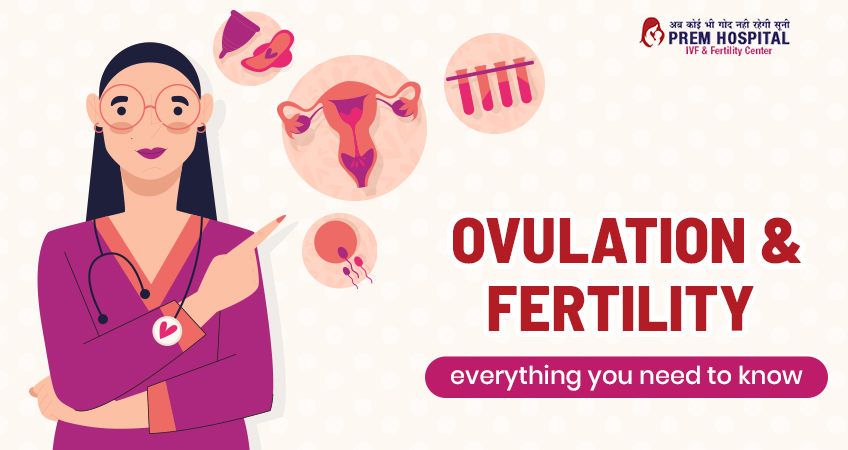Ovulation Induction is something that every woman should understand before planning for a baby. Your chances of getting pregnant largely depend on ovulation, so let’s know more about ovulation and female fertility treatment.
Know your monthly cycle
It is important to know your menstrual cycle, as it enhances your chances of becoming pregnant. The possibility of becoming pregnant starts with the first day of periods. At that time follicle-stimulating hormone (FSH) is released by the body which causes the growth of eggs inside ovaries. Between 2-14 days, these hormones thicken the uterus lining for fertilization. This stage is called follicular.
A process that happens during ovulation
The average menstrual cycle of women is 28-35 days. Ovulation happens between 11 to 21 days of the cycle. During this period luteinizing hormone (LH) increases in the body which triggers the ripe eggs. At this time body’s cervical mucus becomes more slippery thus making it easy for sperm to make their way to the egg.
Time is everything
Every woman is born with around 1-2 million eggs but releases only 300-400 in her complete lifetimes. Usually, one egg is released each month. The released egg then travels through the fallopian tube which connects the ovaries and uterus. If the timing is perfect sperm will fertilize the egg on its way to the uterus. If the fertilization doesn’t happen during 24 hours of the egg leaving the ovary, the egg will dissolve. Sperm remains in the body for 3-5 days, hence if you know your ovulation period you can plan the intercourse in the days when your chances of becoming pregnant are more.
Keep a record of your most fertile days
Usually, the best chance of becoming pregnant is 1-2 days before ovulation. If you have 28-days of the menstrual cycle, then doing sex 14 days before your next period cycle will work. Involve in sex regularly on these days, you can take help from online ovulation cycle tracking tools which can let you know the exact date of intercourse.
Check ovulation with body temperature
Once the egg is released from the body, progesterone level increases in the body to maintain uterus lining. In that period your body temperature will increase slightly. With the help of a basal thermometer, you can check the body temperature to track your ovulation. You will find these thermometers at any medical shop. But remember, this process is not much accurate as compared to other ovulation tracking methods.
Ovulation prediction through hormone
With the increase in LH ovaries releases eggs. Such a surge in LH happens 36 hours before the eggs are released. Ovulation kits help women to know the LH level in urine to know the date of their ovulation. These kits are available at any medical store and cater most accurate results. You can test LH level before 1-2 days of its surge, to know the rise in LH.
The last phase of the menstrual cycle
In the second half of the monthly cycle, body progesterone increases to build the uterus lining for a fertilized egg. In case of no fertilization, it disintegrates progesterone level and after 12-16 days your menstrual cycle starts which causes the shed of blood and tissues from the uterus lining. This usually lasts for 3-7 days.
Weight impacts fertility
Excess weight can make you infertile; if you are doing family planning then it’s the time to lose weight. As per the research done, a woman with a greater BMI takes more time to become pregnant, as compared to those with a normal BMI. If you lose weight by 5-10% your chances of conceiving will increase significantly. Obesity can also lead to low testosterone in men.
Age also matters in conception
Fertility decrease as you cross the mid-30s. It also lowers the success rate of female fertility treatment. As per experts, couples should reach doctors if they are under 35 and unable to conceive in one year. Couples which are above 35 should contact specialists if unable to conceive in 6 months.
Fertility chances decrease in older men too
As per studies, sperm movement and count decreases with age, but there is no specific cutoff for a man to become a father. It is believed that a man of 45+ of age takes a longer time to make a woman pregnant. If your partner is older, you can consult your doctor to boost up the chances of conceiving.
Infertility Treatments
To treat female infertility several treatments are available. The first thing is to consult a doctor who will check man and woman. Infertility can be treated through medications or IVF. IVF is a process of egg removal from ovaries and do external fertilization and then implanting them back into the uterus.
It is always better to know about ovulation induction treatment and other fertility factors to increase your chances of pregnancy. Hope you have got a better understanding of all such things through this article.

